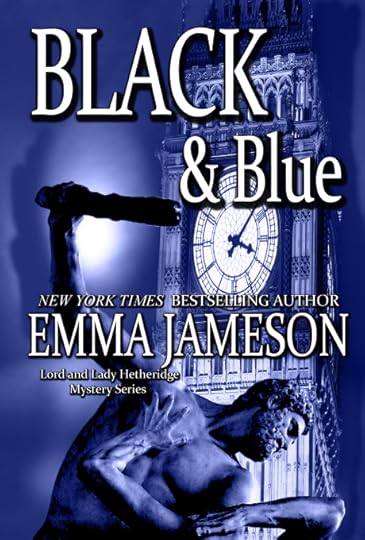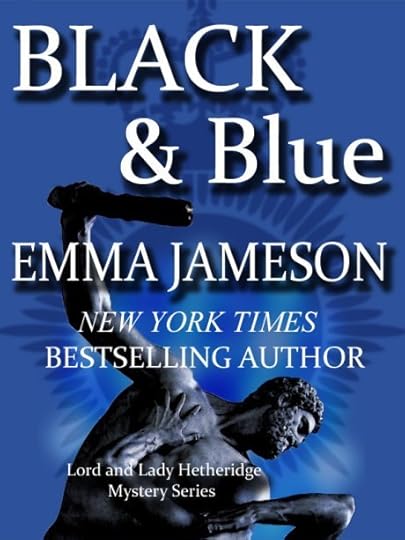S.A. Reid's Blog, page 2
February 20, 2021
Saturday Books — 20 February 2021
Lately I’ve been contending with the Tudors again. I do this periodically. I’ve always been fascinated by Elizabeth I, of course, but in the last ten years I’ve become more interested in earlier Tudor and Tudor-adjacent figures: Henry VIII, Catherine of Aragorn, Thomas Cromwell, and Cardinal Wolsey. I recently read an intriguing review of The Mirror and the Light, Hilary Mantel’s trilogy imagining (and to a large degree, re-inventing) Thomas Cromwell’s life. This led me to listen to the unabridged audio versions of Wolf Hall, Bring Up the Bodies, and The Mirror and the Light, all of which I heartily recommend. They’re not light, easy reads, so for a palate cleanser, I’m now listening to The White Queen by Philippa Gregory. It’s fun and she’s a skillful writer whose work I enjoy.
Anyway, I mentioned all this to say, I’m quite enjoying a lesser-known, nonfiction book about the seamy underside of the Tudor world called The Sorcerer’s Tale by Alec Ryrie. He’s a professor in the Department of Theology and Religion at Durham University, UK, specializing in the history of the Reformation. This book is a scholarly but eminently readable account of the Tudor world’s dark underbelly: cheaters, conjurers, bawdies, pimps, quacks, and every variety of magician. Some were “multipliers” who claimed to turn one coin into many; some were pseudo-respectable “astrologers,” since astrology was perfectly legal to practice, but they offered services like the forging of magical rings and the conjuring of Orpheus.
The Sorcerer’s Tale is filled with historical details I’m finding irresistible. (I’m about halfway through the book.) In a passage about the ubiquity of crime in Tudor London, he offers this description:
A less complex crime, and one which appeared in the courts as well as in the bookshops, was ‘hooking’ or ‘angling’: using a fishing rod or something like it to ‘fish’ blindly through open first-floor windows at night, to see what could be snagged. Bed sheets and blankets were the most likely prey.
Alec Ryrie, THE SORCERER’S TALE
There’s something I never could have dreamed up for one of my novels!
What are you reading? Let me know in the comments.
The post Saturday Books — 20 February 2021 appeared first on Emma Jameson.
February 19, 2021
Back to Blogging!
Hi, all!
Gosh, I’ve been away from blogging for a long time. Let me start with a short post revealing the things I’ve been up to during my long absence.
First: Cats. Joining Howard, Zahara, and James is my new lad, Bobby. (So named because he’s more or less tail-less, or bobbed, in the rear guard.) Bobby was a street cat living a life of desperation when we found him. He darted into our garage, clearly frightened to death, but determined to eat some old, dried-up, rejected cat food or die trying. After finding no trace of him in the various local “lost pet” listings, and after a positive trip to the vet, he joined our happy home.
[image error]BobbySecond: a new book series. This has been underway for some time, but I couldn’t say a word about it until recently. It’s called the Jem Jago Mysteries, and Book #1 is A Death At Seascape House. Here’s the cover created by the wizards at Bookouture, digital publishers extraordinaire:
[image error]The cover of my new mystery!Third: lockdown/COVID-19 culture. I’m as sick of it as you are, but I’m grateful not to have lost any relatives or friends yet. I hope all of you are well, and that the vaccine rollout soon allows us to resume a normal life.
More later! In the meantime, I’ll about to find out if I still remember how to post a blog entry. Cheers!
The post Back to Blogging! appeared first on Emma Jameson.
August 21, 2017
Game of Thrones: A Perfectly Evil Cersei Theory
Happy Eclipse Day! Something about the eclipse started me thinking about Cersei, and that sparked a new “valonqar” theory. But first, let’s touch on last night’s Game of Thrones episode. 7.6 ,”Beyond the Wall,” was a mix of everything I love and everything I strongly dislike about the show. Here are my short takes on the various facets of the episode:

Arya Vs. Sansa: Horse hockey.

Dany and Jon: Yes.
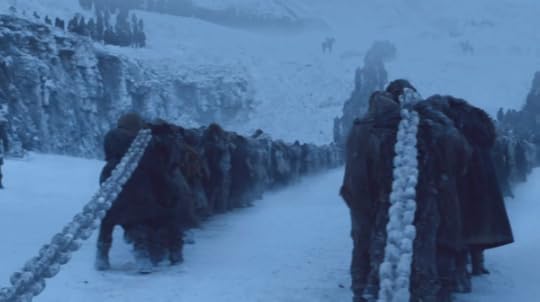
Chains in the land of no forges: from the boat docks at Hardhome.

Viserion the Wight Dragon: How did I never foresee this?
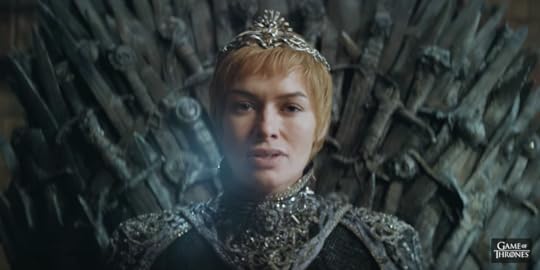
Now, here’s my perfectly evil, indefensibly dark Cersei theory, which came to me while the sun was blotted out overhead. It ties into the “Valonqar” prophecy. To recap:
Cersei: Will the king and I have children?
Maggy: Oh, aye. Six-and-ten for him, and three for you. Gold shall be their crowns and gold their shrouds, she said. And when your tears have drowned you, the valonqar shall wrap his hands about your pale white throat and choke the life from you.
As you might recall, “valonqar” means little brother or (perhaps) little sister. Cersei interpreted it to mean Tyrion, her despised youngest brother, would kill her if she didn’t kill him first. I never believed it would be Tyrion; that seemed too easy. For a long time I was convinced it was Jaime, her twin and technically her little brother–what better punishment for Cersei than to be killed by her staunchest ally? Then I remembered he only has one hand. Naturally, prophecies can be woolly and inexact, but that’s a problem. Plus, Jaime is so darn loyal! If he didn’t snap after she blew up the Sept, I don’t think he’ll kill her, ever.
Of course, “little brother” (or maybe sister) is very vague, and easily expanded to other families. Arya’s a deadly little sister who could surely kill Cersei. Dany’s a little sister, too. Either of them as the valonqar is more believable (and less disgusting) than what came to me. [Disclaimer: writers are strange people. I can’t help where my mind goes.]
Suppose Cersei isn’t lying about her pregnancy. It isn’t a lie to manipulate Jaime, or that old TV chestnut (menopause-mistaken-for-one-last-baby), but she’s really pregnant. During the Long Night, she goes into early labor and loses the baby. As she weeps, the valonqar stirs, reveals its glowing sapphire-blue eyes, and strangles her.
I know. How do I sleep at night? MUAHAHAHAHAHAH
And while we’re on babies and prophecies, let’s reexamine the prophecy that caused Dany to believe she’ll never have children:
“When the sun rises in the west and sets in the east,” said Mirri Maz Duur. “When the seas go dry and mountains blow in the wind like leaves. When your womb quickens again, and you bear a living child. Then he will return, and not before.”
Now what follows isn’t mine; it seems to have arisen from the collective wisdom of the web. It also pertains to events in the books, particularly A Dance with Dragons, so if you only follow the TV show, you’ll just have to trust me. The explanation for the prophecy goes as follows:
These are not impossible paradoxes, but rather poetic descriptions of real events. It suggests that “when the sun rises in the west and sets in the east” refers to Prince Quentin Martell of Sunspear, who grew up in the west, traveled east, and died there. “When the seas go dry” could mean the Dothraki sea, which Dany notes is dying back. (In the TV show, perhaps the frozen sea is a stand-in.) “When the mountains blow in the wind like leaves” could mean the destruction of the two lesser pyramids in Meereen, which turned to ash and was scattered on the wind. (In the TV show, it might refer to the undead Mountain’s defeat. If he’s rotting under that armor, the Hound might pulverize him, assume the Cleganebowl ever actually happens.) “When your womb quickens again” seems to refer to Dany’s menstruation/possible miscarriage at the end of A Dance with Dragons. So it seems that Dany isn’t absolutely, positively childless. And hey, even if she is, it can still be a happy family:
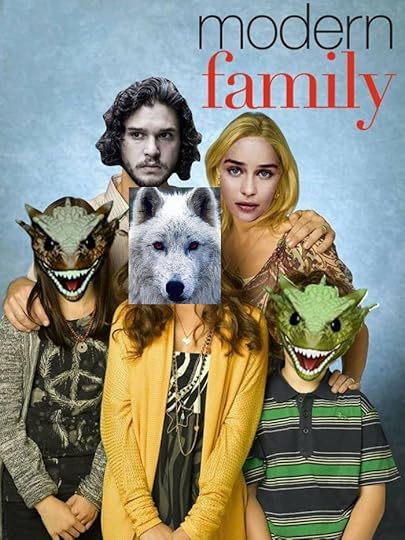
The post Game of Thrones: A Perfectly Evil Cersei Theory appeared first on Emma Jameson.
July 18, 2017
Game of Thrones Season 7: More of my Lousy Predictions
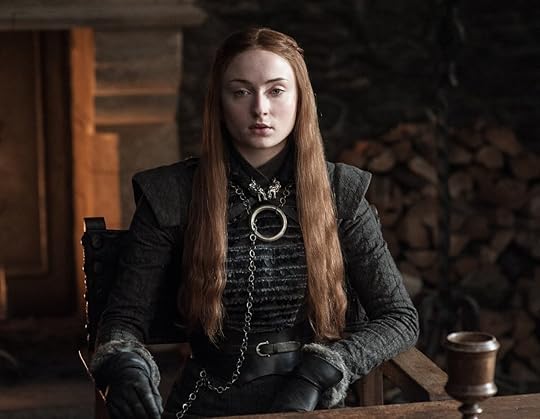
Standard Disclaimer: This post is dark and full of spoilers.
Those who know me also know I am a Game of Thrones superfan. That being said, they won’t be surprised to find me taking a few moments to give you my thoughts and (bad) predictions about the GoT season 7 opener, “Dragonstone.” Here goes.
Arya
Glad to see she wiped out the Freys. The scene also showed something I’ve resisted: that part of her secret “Faceless Man” craft allows her to temporarily assume a completely different physicality. As Walder Frey, she was taller, with a man’s voice, and completely indistinguishable from the real thing. So… that opens a lot of new avenues, doesn’t it?
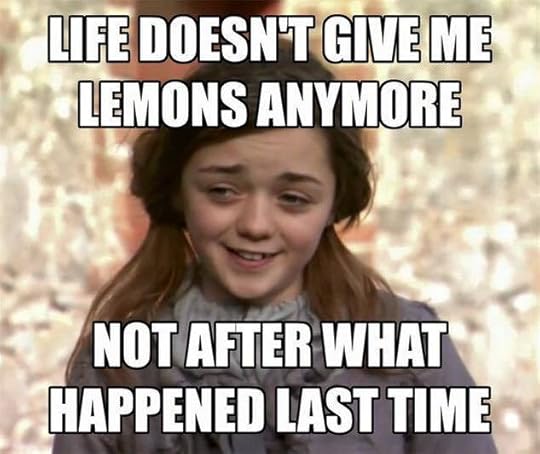
I enjoyed the scene with Arya and the Lannister soldiers and was surprised by the Ed Sheeran backlash. It was good to see Arya, who’d just killed her Frey enemies scorched-earth style, confronting the fact that her Lannister enemies aren’t all as bad as Cersei.
Prediction: I think the Lannister soldiers will run into a dangerous “super pack” of wolves led by a direwolf as wild and ungovernable as Arya. Perhaps she’ll save those soldiers. (Perhaps not.) But if Arya and Nymeria reestablish their relationship, it might help both of them.
The Hound
Interesting that he, too, saw a vision in the fire. Never expected him to have a religious experience! So many of us have anticipated a “Cleganbowl”: a rematch between the Hound and his now-undead brother, the Mountain. But if the Hound is going North, it seems like that won’t happen.
Cersei, Jaime, and Euron
I was disappointed to see Jaime just wandering around the Red Keep like his sister’s minor league henchman. Is he really okay with his twin blowing up a big chunk of King’s Landing and committing the very crime he lost his honor to prevent?
As for Euron, I haven’t warmed up to him as a villain. Having said that, he’s a little brother with two good hands. That means he might be Cersei’s killer, according to the prophecy.
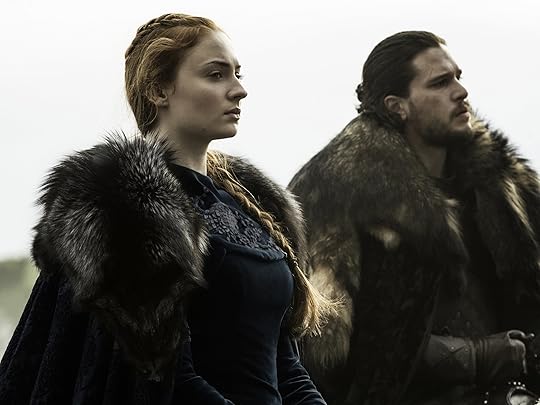
Sansa and Jon
Okay, so, can I just say, I adore you, my fellow fans. “Sansa’s wearing her hair like Cersei!” “Sansa admitted she admires Cersei to some degree!”
Um, yeah. Latch onto those misdirects. Here’s my prediction:
Sansa will break with Jon and depart the North with Littlefinger, Bronze Yohn, and the Aerie army. At the Aerie, she will marry either Robyn (the revolting teen heir) or Littlefinger. He will consider his triumph complete. In the throne room alone with Littlefinger, we will see the scene from which the final trailer lifted Sansa’s emotionlessly intoned dialogue:
When the snows fall and the White Winds blow, the lone wolf dies. But the pack survives.
Out of the shadows comes Jon and Arya. Littlefinger is backed onto the Moon Door. Then–his long climb ends. (Bonus: if the wall collapses, the Aerie will be a good place to hang out as the army of the dead rushes over Westeros.)
Why do I think this will be Littlefinger’s literal downfall? Remember why Sauron never expected anyone to try and drop the One Ring into Mt. Doom. His mind could not conceive of someone willingly giving up such power. Littlefinger cannot conceive of love and absolute loyalty between family members. Fooling him with a couple of public spats will be all too easy.
Okay, now I’ve got this off my chest, so it’s time to get back to work. Have a wonderful week, everyone!
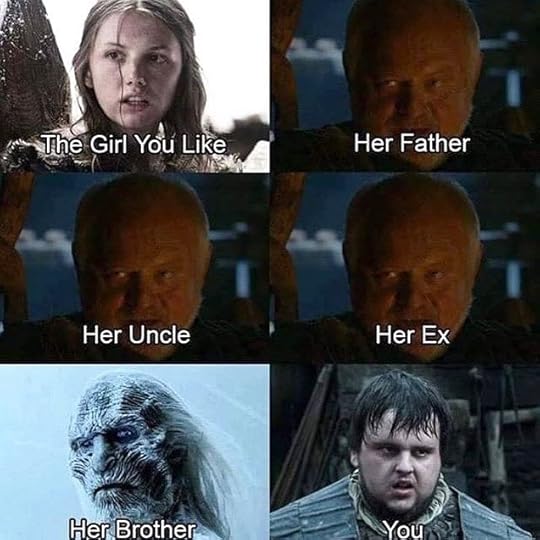
The post Game of Thrones Season 7: More of my Lousy Predictions appeared first on Emma Jameson.
April 25, 2017
Cover Reveal: BLUE BLOODED (Lord & Lady Hetheridge #5)
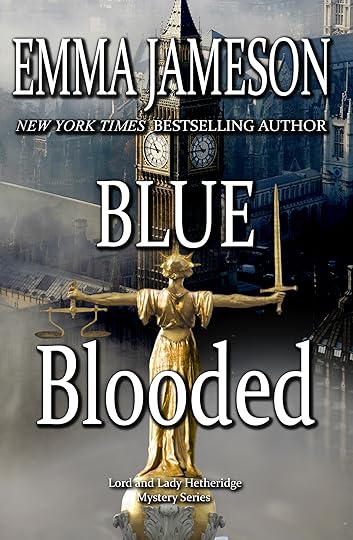
It’s lovely to be back. I’m still working out a few details on this, my new website and blog, but I wanted to wade in with the cover reveal for my upcoming book. Blue Blooded (Lord & Lady Hetheridge #5) is currently available for pre-order exclusively on iBooks.
If you shop at a different vendor, never fear: on release day, June 6th, the book will be available at all major ebook retailers: Amazon (Kindle), Barnes & Noble (Nook), Kobo, and Google Play Books (Android devices) as well as iBooks (Apple devices).
Thanks for stopping by! And if you haven’t already, please pop over to visit iBooks’s Blue Blooded page and read the description for Lord & Lady Hetheridge, Book #5.
The post Cover Reveal: BLUE BLOODED (Lord & Lady Hetheridge #5) appeared first on Emma Jameson.
September 20, 2016
Hello world!
Welcome to WordPress. This is your first post. Edit or delete it, then start writing!
The post Hello world! appeared first on Emma Jameson.
May 8, 2015
Coming Soon…
… very soon. It’s with the proofreader now, and that means before long, it will be shipshape and Bristol fashion, meaning ready to go on sale.
MURDER IN MAYFAIR
Modern art dealer Granville Hardwick has a way with people — a way of making them wish he were dead. His London gallery is filled with works of questionable merit, his dating pool consists of other men’s wives, and his home is the eyesore of a fine old neighborhood. The neighborhood of Scotland Yard’s Chief Superintendent Tony Hetheridge, as a matter of fact. So when Hardwick turns up dead, bashed on the head by a rather tasteless reproduction, it’s Hetheridge and his new bride, Kate, who embark on solving the case.
LORD & LADY HETHERIDGE
When he married Kate, Tony expected things to be different. But with Kate’s ne’er-do-well relatives making trouble on the home front, and his own enemies attacking from inside Scotland Yard, the case of the dead art dealer and three unfaithful wives might do more than change Mayfair. It might change Lord and Lady Hetheridge forever.
Return to the world of Ice Blue in Black & Blue, the fourth in the New York Times bestselling Lord & Lady Hetheridge mystery series, which readers call “witty,” “packed with interesting characters,” and “consistently entertaining.”
Filed under: Black & Blue, Books, Emma Jameson, Ice Blue, Lord and Lady Hetheridge Series, Writing Tagged: anglophile, Books, cozy, cozy mysteries, cozy mystery, ebooks, emma jameson, fiction, New York Times bestseller








February 20, 2015
Black & Blue, Chapter One
Hello! I’d really love to have this book completed and in the hands of my awesome “Brit-picker” (expert Englishwoman), my incredible editor, and my beloved proofreader within the next 3-4 weeks. I think it’s going to happen. Of course, because I am so, so slow, many of you will find that assurance hard to believe! Therefore, I offer this: Chapter One. Please note, my team haven’t been at it yet, so heaven knows what typos I’ve overlooked. But it should give you a taste of what’s to come, and serve as “proof of life,” as the crimelords say.
Black & Blue
Lord & Lady Hetheridge #4
Chapter One
Once upon a time, Anthony Hetheridge, ninth baron of Wellegrave and chief superintendent for New Scotland Yard, enjoyed a neat, orderly life. Awakening before dawn most days, he ate breakfast with his subordinates, spent lunch poring over his open cases, and remained on the job until six or seven that night. Yet he never felt overworked, because his London home, situated in the very heart of Mayfair, was an oasis of tranquility. Gracious rooms, a walled garden, a place for everything and everything in its place. His old-fashioned manservant, Harvey, always kept a hot meal waiting. After supper, Hetheridge read in his study for an hour or so, then retired to bed, content to repeat the cycle the next morning. But somewhere in the vicinity of his sixtieth birthday, Hetheridge’s private life began to feel a little, well, too private. Tempting fate, he wished for a change. And something wonderful and terrible happened: his wish came true.
“It’s not fair!” A small boy shrieked, colliding with Hetheridge as he entered the kitchen, knackered from another long day at the Yard.
“I say.” Hetheridge caught the boy before he could dart outside. It was only a quarter past six, but pitch dark and bitterly cold as only mid-January could be. “What’s all this?”
“I’m leaving!” Henry Wakefield, pudgy and short for almost nine years old, glared up at Hetheridge, his round face scarlet with rage. “I’m going to Robbie’s. His mum said I could sleep over anytime. They like me at Robbie’s. They listen to me at Robbie’s. Here, the only way I could get Kate’s attention is by killing someone.”
“Is that so?” Hetheridge, who’d spent the day tackling phone calls, meetings, and policy revisions—the unglamorous bulk of police work at a chief superintendent’s level—could had done with a real murder just then. But it was bad form to say so, at least outside the Yard. “Why don’t you sit down? Put me in the picture.”
“It won’t do any good,” Henry cried, twisting so wildly in Hetheridge’s grip, he broke free. Either the boy’s weekly fencing sessions were beginning to pay dividends of strength and agility, or anger lent him strength—some fury deeper than the endless power struggles Henry and Ritchie sprang on one another from dawn to dusk.
“Henry.” In Hetheridge’s resonant tones, that single word filled the kitchen, echoing off the black and white tiled floor and the multitude of copper pots and pans, relics from his grandmother’s day. How long had it been since an adult raised his voice to a child in Wellegrave House’s formerly serene kitchen? So long, Hetheridge could practically hear bustles creak and walking sticks thud as ghosts, undisturbed since Queen Victoria’s day, surged forth to investigate.
Already to the kitchen door, Henry stopped. Slowly, he turned, mouth quavering and fists clenched at his sides. One kind word and he’d burst into tears.
“It’s hardly fair to say I can do no good, when you haven’t given me a chance,” Hetheridge continued, tone deliberately stern. “Why don’t we—”
“Terribly sorry, Lord Hetheridge.” Harvey, who never ran if he could walk and never walked if he could glide, was panting as if he’d sprinted to the kitchen, possibly from Battersea. His normally immaculate uniform was splashed with something reddish-brown; his comb-over, usually shellacked in place, had reversed direction, giving him the unfortunate appearance of a man who’d flipped his lid.
“There’ll be no supper tonight. The soufflé has fallen and the sauce is burned. As for the state of the chicken—” Taking a deep breath, Harvey closed his eyes. “It’s shameful. Forgive me, my lord.” He sounded utterly defeated. “We’ve had more rows than one servant can manage.”
Keeping a firm hand on Henry, Hetheridge eyed Harvey’s shirtfront. “Is that blood?”
“Yes.”
“Whose?”
“Lady Hetheridge’s.”
“Good God. Is she quite all right?”
“Yes, my lord. But we may yet need to ring 999 for, er—” Harvey’s eyes slid to Henry. “Our, er, guests.”
“I’m going to Robbie’s,” Henry declared again, voice breaking. He swiped his face with his sleeve.
“No, you’re not.” Hetheridge tightened his grip on the boy’s shoulder. “You’re coming with me. Harvey, where is my wife and our guests?”
“The parlor, sir.”
“Where’s Ritchie?”
“In his room, watching telly. I don’t believe he’s aware of what’s happening.”
“Thank heavens for small favors. Now why don’t you sit down? Have a brandy. Order us all some takeaway—curry will do. Now then, Henry,” Hetheridge said, steering the boy toward the kitchen’s swinging doors. “Let’s get this sorted, shall we?”
***
For years, Hetheridge had relied on Wellegrave House’s stairs almost exclusively. A day or two off from such activity and his arthritic left knee might conclude it was being favored, and that would never do. Hetheridge’s view on stiff, aching joints was simple: he who admits to the actuality of pain stops, and he who stops, dies. Given his status as a newlywed (a term he pretended to flinch at, but secretly enjoyed), Hetheridge had no intention of stopping any time soon. But Henry, drawn to all forms of technology, especially those that saved a step or three, usually wanted to ride the antique, brass-gated lift. Tonight he trudged to the stairs alongside Hetheridge, head down and mouth set.
“Who’s up there?” Hetheridge asked. Though from Harvey’s tone as he uttered “Our guests,” there could be little doubt. Harvey, formerly an aspiring stage actor before he swapped the footlights for domestic service, could pour a wealth of fear and loathing into two normally innocuous words.
“Mum. And Gran.” Henry sighed. “I wanted Mum to get out of the—the hospital. For so long, I wanted to meet Gran. And now I have.”
Hetheridge said nothing. Before meeting Henry, his experience interacting with small children had been virtually nil. Was he meant to offer some platitude here? He wasn’t in the habit of coddling his subordinates. And heaven knew, his own father had never coddled him. In the late Lord Hetheridge’s estimation, praise, encouragement, and treats were for his prized Springer Spaniels, not his children.
Perhaps that’s why I’ve never owned a dog, Hetheridge thought. For the first time in ages, one of the framed portraits on the landing caught his eye—a faded oil of his grandfather enthroned en familie: leather chair, whiskey in hand, favorite bitch and three pups arranged around his feet. Clustered around it were black-and-white photographs of Hetheridges long dead, aunts and nephews, cousins and uncles, all with the same grim mouth and icy stare. Though he passed this landing two or more times each day, Hetheridge found himself truly seeing the frozen faces that had watched him since boyhood. Prompting an inner wellspring of deep emotion:
Who the bloody hell are these people and why in God’s name are they looking down on me?
Henry gained the landing with obvious reluctance. He stopped a few meters from the parlor door, which was closed, like a condemned man in sight of the gallows.
“About my mum.” He spoke with head still down, stuffing his hands in his pockets as if they might fly up and cram themselves into his mouth. “I think she’s still sick. I think….”
“Just you wait, you stupid cow! You’ll be sorry!” a female shrieked from the other side of that gilt-trimmed, crystal-knobbed door. Hetheridge didn’t recognize the voice, but Henry clearly did.
“Mum! Stop!” he cried, flinging the door open with such force, it collided with the wall.
Following the boy inside, Hetheridge unconsciously slipped into detective mode, taking in the complex scene with the sort of diffuse focus good policemen cultivated, registering every detail, big or small, as fully as possible. Features of the parlor he tended to screen out, like those dour Hetheridges hung on the landing, leapt out at him: light green wallpaper, shelves full of cloth and leather-bound books, two shaded lamps, a velvet settee from the 1920s, a cold fireplace with polished brass fender, and a glass-fronted liquor cabinet. Usually it was locked; tonight, it was open, and two bottles of scotch had migrated, though not far.
Kate, in the foreground, looked more tigress than baroness. Her upper lip was cut and crusted with dried blood; blonde hair, wilder than ever, floated around her face like a mane. Her elder sister, Maura Wakefield, stood by the drinks trolley with a glass in one hand and an icepack in the other. Her hair, brassier than Kate’s, was threaded with white; deep lines cut beneath her eyes and along the sides of her mouth. Her nose was twice as red and swollen as Kate’s upper lip.
On the velvet settee sat a woman the tabloids respectfully styled Mrs. Louise Wakefield, although her rap sheet also listed her as Lolo Carter, Lolo Shumway, and Lolo Dupree. In old mug shots, Louise was a bottle-blonde sporting hairstyles of the rich and famous: once Twiggy, then Kylie, then Diana, and even Posh Spice, back when the Spice Girls were a recording group, not a quiz show answer. Today she’d bobbed her now-white hair, perhaps in imitation of Adele; the lines that bisected Maura’s face were stacked four deep on Louise’s brow. For all that, she looked happy, with an open bottle of Johnnie Walker on the coffee table and a large scotch in her hand. From Kate to Maura to Louise, the three women formed a triangle as highly charged as its counterpart off the coast of Bermuda.
And about as inviting, Hetheridge thought. He’d known this day would come, when he’d be obligated to meet the in-laws. He just hadn’t reckoned on split knuckles and spilt blood.
“Mum, stop?” Maura repeated, giving Henry a hurt look. “Your poor old mum’s just defending herself, love. Look at my face! Your precious Kate attacked me. Broke my nose. All because—”
“Kate,” Hetheridge thundered. The parlor’s acoustics weren’t as impressive as the kitchen’s, but a single word had a similar result. Halted in mid-rant, Maura’s mouth hung open for a split second, then snapped shut. High color rose in Kate’s cheeks; she curled her left hand around her right, concealing the fresh plaster Harvey must have applied. Caught with her large scotch halfway to her lips, Louise stared at Hetheridge with undisguised fascination.
“Thought you’d be taller,” she said.
“Kate,” Hetheridge repeated in his normal tone. “Forgive me for intruding this way. Won’t you please introduce—”
“Oi! If you haven’t heard, Jane Austen’s dead, Lord Hetheridge, and Charles Dickens ain’t looking so hot himself. Guy Fawkes is the horse I bet on,” Maura announced, East London bray slightly slurred. “I know two hundred years ago, commoners were introduced to aristocrats and never the other way round, but this is the twenty-first century and I can introduce myself. I’m Maura Wakefield.”
Putting down icepack and drink, she advanced with right hand stuck out, apparently so intent on making her point, she didn’t notice her son was trembling violently. Moving just behind Henry, Hetheridge ignored the demand to shake, instead resting both hands on the boy’s shoulders. Beneath the layers—hooded jacket, cable knit sweater, button-down shirt—he felt Henry’s tremors slowly lessen. Only when they completely abated did Hetheridge speak, directing his words to Henry alone.
“Would you like to go down and help Harvey?”
“I can’t. Kate and Mum. They’re arguing over me.” Henry gazed up at Hetheridge, round face scarlet, glasses slipping down the bridge of his nose. “I wanted to go to Robbie’s, but I guess running away won’t solve anything. I need to stay.” As if sensing Hetheridge’s misgivings as to the wisdom of such a proposition, Henry added, “I have a right to stay!”
“Very well. In that case, I have no doubt,” Hetheridge said with finality, “we adults will keep matters civil. Perhaps even cordial. Ms. Wakefield.” Approaching Maura slowly, Hetheridge allowed himself to smile as he held her gaze, as if he’d sighted her across a ballroom, cutting through a dozen waltzing couples to seize her gloved hand and lift it to his lips. Her shoulders drooped; the deep fissure between her eyes relaxed. In surprise, she looked vulnerable, and when vulnerable, her chin trembled just the way Kate’s did. “I’m Anthony Hetheridge. My friends call me Tony; I hope you’ll do the same. Let me start by begging your forgiveness for eloping with your sister. It was terribly selfish, and I promise to make it up to you.” Maura’s arms hung at her sides—she seemed too starstruck to shake—so Hetheridge dared a bow from the waist, the sort of puffery now considered overdone outside of Buckingham Palace.
“Lookit that,” Louise marveled. Belting back the last of her Johnnie Walker, she slammed her glass on the table and sprang up, seemingly cured of the various afflictions—backache, knee pain, flat feet—that had prevented her from seeking paid (legal) employment her entire life. “Kate! Introduce me! Never mind all that about Guy Fawkes and anarchy in the UK, I want it done proper.”
Kate took a deep breath. “Tony, this is my mum, Louise Wakefield. Mum, this is my husband, Tony.”
“Title,” Louise said out of the side of her mouth, staring at Hetheridge.
“Lord Hetheridge. Baron Wellegrave,” Kate said dully.
Sensing his cue, Hetheridge gave old woman a longer, deeper bow, imagining the Queen in her pink chiffon suit and beribboned hat instead of Louise in her tracksuit and trainers.
“Enchanté.” Louise dropped a passable curtsey.
“Mum,” Kate and Maura said in the same moment, and the same tone.
“Bloody hell, I’m only human. First time I ever met a person of quality,” Louise said.
“I’m a baroness, if you didn’t notice,” Kate ground out.
“Nobody likes a braggart, Katie.” Plopping back onto the settee, Louise splashed more scotch into her glass. “Now that we’re all acquainted, Tony, let me clue you in. Our Maura’s been through the wringer—all the way through, mind you, and no thanks to your lot at the Met, but no hard feelings, either. She done her time in hospital and now she’s out—”
“In a halfway house. Pending conditions,” Kate cut across her mother.
“—and it’s high time poor little Henry was back in her life. Mine, too. I need to see my grandson,” Louise said, taking a sip. You’ve done right by him, Katie, but being rich isn’t the same as being God. You can’t bully your sister the way you bully everyone else and expect her to slink off, tail between her legs. Not when her only child’s happiness is at stake.” Taking another sip, she shot Hetheridge a beatific smile. “Good stuff, Tony. Smooth as a baby’s arse.”
“What do you mean, bully Maura and everyone else?” Kate demanded of Louise. “Bullies get things. I’ve never had a thing from either of you, not in my whole life! I practically raised myself. I paid the bills when you scarpered. Nicked food when you didn’t stock the fridge. Chatted up the landlord to keep a roof over all our heads. And as for you,” she continued, swinging toward Maura with such narrowly contained fury, Hetheridge thought he might have to physically restrain her. “You flushed your life down the karzi, not me. All I did was keep Henry from going into care. I’ve seen the system from both sides, and it’s rotten. I wanted to save him! And this is the thanks I get?”
“Kate.” Henry’s voice cracked. He was trembling again.
“Look at my poor boy’s face.” Maura sounded genuinely distraught; her eyes shone with tears. Either she was a natural actress, Hetheridge thought, or the whiskey was having an effect. “Is this what you do, Kate? Poison him against me? Tell him how terrible Mum and me are, and what a saint you are?”
“Of course it is. That’s our Katie, always keeping score,” Louise said, as serenely as a pensioner discussing Coronation Street. “Probably expects me to apologize for every Christmas she didn’t find her heart’s desire under the tree. Held me to impossible standards. I remember it all, Katie, every time you judged me. It’s all etched in my memory, written in blood.”
“This is stupid,” Henry exploded. “You’re all so—so—stupid!”
Before Hetheridge could concur, albeit in slightly more diplomatic language, Kate said in a voice of deadly calm, “Mum. I don’t expect you to apologize because I never found my heart’s desire under the tree. That’s because we never had a Christmas tree. Not once. And if your memory’s so sharp, answer me this: when is Ritchie’s birthday?”
Louise blinked. “What?”
“Ritchie. My brother. Your son.” Kate folded her arms across her chest. “He’s in his room, playing with his Legos. You’ve been here all this time and you haven’t even asked about him. When’s his birthday, Mum?”
“For heaven’s sake, Ritchie’s fine! This isn’t about Ritchie, it’s about Henry.” Maura sniffed, wiping her eyes. “Henry, baby, you still love me, don’t you? You understand I had to go to hospital, I had to get well….”
“Tell us his birthday, Mum. Amaze us,” Kate said. “I won’t even hold you to the year. Just the month and day.”
“Ritchie’s a lost cause.” Louise rose with all the dignity available to an inebriated senior citizen in a FUBU track suit. “Because you stole him from me. Bribed him and lied to him until he forgot me. But you won’t do that with Henry. We won’t let you.”
“Kate,” Henry said, louder. “Mum….”
“You are the last person on earth I take orders from,” Kate told Louise. “And when it comes to Henry—”
“He’s my son,” Maura cut in.
“I’m right here!” Henry cried. “Doesn’t anyone care what I want?” Breaking into tears, he whirled, trying to dart out of the parlor, but Hetheridge blocked his escape.
“Stand your ground,” he whispered close to the boy’s ear. Forcibly turning Henry to face Kate, Maura, and Louise, Hetheridge said, “It’s a fair question. Do any of you care what he wants?”
“Tony!” Kate’s green eyes flashed. “How can you ask me that?”
“I would die for Henry!” Maura surged forth as if to embrace the boy.
“No!” Henry threw himself against Hetheridge, sobbing noisily into the wool coat Hetheridge had forgotten to remove. Unsure how to respond to either the gale of emotion or the death grip around his middle—never before had a weeping child attached itself to Hetheridge—he decided to carry on as if it weren’t happening.
“Would you care to answer?” he asked Louise.
“Kiddies don’t know what they want. Or need,” she sniffed. “That’s why God made adults, innit?”
“Terribly sorry, milord,” Harvey announced from the doorway. “Scotland Yard on the line for you, sir. They’ve rang your mobile several times without luck. Must be a satellite issue.”
Hetheridge, infamous among his younger colleagues for switching off his mobile when it suited him, not to mention behaving as if texting were a mass delusion to which he alone was immune, nodded as if carrier failure was obviously at fault. “Who called?”
“Assistant Commissioner Deaver, milord. There’s been a homicide. Special Response has been summoned—the scene may still be hot.” Harvey, every millimeter the professional from his restored comb-over to his gleaming wingtips, kept his face blank, as if taking no pleasure in such casual use of Met lingo. Nevertheless, satisfaction radiated off him in waves. Harvey was always most alive when delivering official Scotland Yard communications.
“Wh-what’s a hot scene?” Henry asked, releasing Hetheridge at last.
“That’s when the murderer might still be loitering about,” Louise said wisely. “Bloody hell, Kate, don’t you let the little bugger watch Crimestoppers?”
“What address?” Hetheridge asked Harvey.
An infinitesimal pause for effect. “24 Bruton Place.”
Kate gaped at Harvey as if he’d slipped into Swahili. “But that’s …”
“In this very neighborhood. Three houses up the street, to be precise. Therefore, though it pains me to do so,” Hetheridge lied smoothly, “I fear I must ask our guests to leave.”
“Of course we’ll go. But we’re taking Henry home with us. You can’t abandon him in this drafty old house while you and Kate poke about a murder scene,” Maura said.
“Madam, I shall be with him.” Harvey lifted his chin.
“Oh, sure, a butler. Might as well put Ritchie in charge.” Maura sounded scandalized.
“Ritchie looks after me just fine,” Henry announced, defending his chief nemesis with a fervor usually reserved for superheroes and Jedi knights. “He’s older than Kate.”
“He’s been daft every day of his life and you know it,” Maura snapped. “And a butler isn’t your blood. I’m your mum, and I’m taking you home.”
“Maura, I swear to God—” Kate balled up her fist, crinkling the fresh plaster across her knuckles.
“Kate, please.” Hetheridge didn’t meet his wife’s eyes. He didn’t need to; the force of her glare could have been felt from orbit. Instead, he told Maura and Louise, “I understand your position, ladies; believe me, I do. But there’s a certain expression I’ve been told countless times, yet never had occasion to employ.” He rested both hands on Henry’s shoulders and smiled. “Not without a warrant.”
© Emma Jameson, Lyonnesse Books 2015
Filed under: Black & Blue, Books, Emma Jameson, Lord and Lady Hetheridge Series, Writing

December 21, 2014
Emma Jameson: Marriage Can Be Murder
M.K. Graff was kind enough to feature my latest book on her blog, Auntie Em Writes. I’m ever so grateful!
 Originally posted on Auntiemwrites-Mystery Author M K Graff :
Originally posted on Auntiemwrites-Mystery Author M K Graff :
British author Emma Jameson has a new series premiering. The Dr. Benjamin Bones mysteries start out with Marriage Can Be Murder.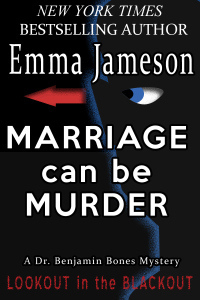
On the eve of World War II, Dr. Benjamin Bones is at war with himself.
While most young men are being sent away to fight the Germans, Ben is chosen to serve on English soil. Ordered to move to wild, beautiful Cornwall, he must trade his posh London office and stylish city life for the tiny village of Birdswing, population 1,221 souls.
But leaving his home and shelving his career ambitions aren’t the only sacrifices facing Ben. His unfaithful wife, Penny, is accompanying him to Cornwall in a last-ditch effort to save their marriage. But moments after their arrival, Penny is run down in the street, and Ben is almost fatally injured. And while the villagers assume Penny’s death to be an accident, Ben quickly deduces it was murder.
View original 3,557 more words
Filed under: Emma Jameson

December 19, 2014
A National Trust Christmas
 Originally posted on Bricks + Mortar:
Originally posted on Bricks + Mortar:
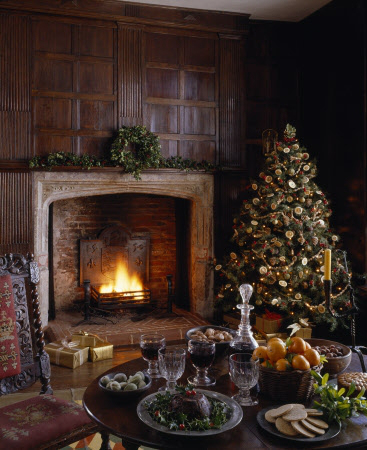
” A typical Christmas scene at a National Trust property with a tree, presents, log fire and a table laden with fruit, nuts, Christmas pudding, wine glasses and decanter” ©National Trust Images/Andreas von Einsiedel
The National Trust works to preserve and protect the coastline, countryside and buildings of England, Wales and Northern Ireland. Incorporated in 1894, The National Trust is one of the largest landowners in the United Kingdom. It owns and operates heritage properties, including historic houses and gardens, industrial monuments and social history sites, most of which are open to the public free of charge.
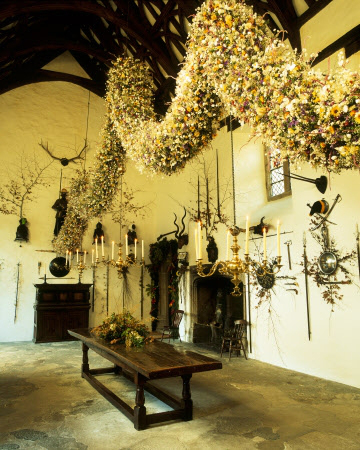
” The Christmas garland in the Hall at Cotehele. The hall is decorated in December for events held in the Hall. Created with dried flowers. ©National Trust Images/Mark Bolton
During the holiday season, the Trust opens many of its most important homes and landscapes for special events including visits from Santa, decorating…
View original 367 more words
Filed under: Emma Jameson

S.A. Reid's Blog
- S.A. Reid's profile
- 154 followers


